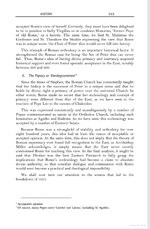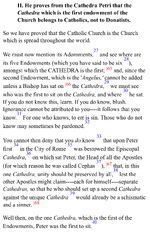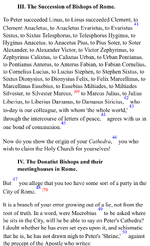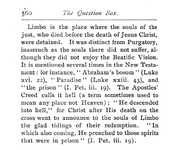You are using an out of date browser. It may not display this or other websites correctly.
You should upgrade or use an alternative browser.
You should upgrade or use an alternative browser.
Catholicism: Criticism & Debate Thread
- Thread starter PurpleUrkel
- Start date
You can find a lot more information and sources about this here: https://www.oodegr.com/english/oikoumenismos/ou_dei.htm#:~:text=Canon 45 of the Holy,, let him be defrocked.”
From the Apostolic Canons:
1. Canon 10 of the Holy Apostles: "If one who is not in communion prays together, even at home, let him be excommunicated”
2. Canon 11 of the Holy Apostles: "If one who is a priest prays together with a defrocked priest, let him too be defrocked.”
3. Canon 45 of the Holy Apostles: "A Bishop, or a Presbyter, or a Deacon that only prays together with heretics, should be excommunicated; if he has permitted them to perform anything as Clergymen, let him be defrocked.”
4. Canon 64 of the Holy Apostles: "If a Clergyman or a Layman should enter a Jewish synagogue, or pray with heretics, let him be excommunicated and defrocked.”
5. Canon 71 of the Holy Apostles: "If a Christian should bring oil to a Gentile altar, or to a Jewish synagogue during their feast-days, or light lamps, let him be excommunicated”
One major issue of going to a Roman Catholic Mass if you're Orthodox is that you're validating the activities and claims of a heretical group (ie, a group that teaches lies about God) by your presence. Heresy is evil as it's a lie, and lies come directly from Satan (again, not saying that all RCs or prots are Satanic, just that they've been misled). If an Orthodox person sees you there, he might think "Oh, it's okay to worship with the heretics." It creates grave scandal. More than this, 2000 years of God-illumined saints have UNANIMOUSLY condemned such practices. Your question would be akin to me asking, "What's wrong with me going to a strip club if I do it to keep a relationship with my brother? Obviously, I won't pay for any lap dances".
Funny enough, the Roman Catholic Church also used to condemn such practices until Vatican II. In the writings of Pope Pius XI's Mortalium Animos, it was considered akin to apostasy to pray or worship with heretics. This teaching of Pope Pius XI is considered apart of the "universal ordinary magisterium" of the RCC because it's a repeat of centuries and centuries of RC consistent teaching. It is therefore infallible according to what is defined at Vatican I. Unfortunately for the RCs, teachings on faith and morals in ecumenical councils are also infallible, as they are apart of the "extraordinary magisterium." So you have a real issue with Vatican II (and consistent papal teaching after Vatican II where popes go to mosques and pray with Muslims, etc) completely contradicting infallible teaching that came before.
Right from your link:
"In accordance, therefore, with the above, we cannot say that common prayer is taking place when we have a case of someone visiting or observing a certain religious ceremony, only for scientific, tourist, social reasons or for reasons of etiquette."
So, if someone discovers Orthodoxy, but wishes to try and improve their original church, they may still attend for social reasons while going to serious prayer at an Orthodox Church.
This is more or less what I've been saying all along.
My understanding is not so strong but basically when Jesus set up the church he set it up with a Pope and so the Catholic church has roots stretching back to Christ that the ORTHO church does NOT.
This is false, please read the first post I wrote in this thread for an accurate, easily verified history. Peter's first Church was at Antioch. His first created Bishops were at Antioch. Moreover Jesus appointed 12 apostles, not 1, and held them to be equal to each other. All in the Book of Acts and NT.
Then there is the issue of men with absolutely no connection to Orthodox countries following the church there. Why is a man in Birmingham going to a Greek Orthodox church? I am not an expert but it makes sense I believe if you have some links through ethnicity or geographical location but not really otherwise.
If you want an authentic, non-ethnic Orthodox experience, try an Antiochian Orthodox Church.
Okay, I know the guy has been banned temporarily, but here's a general question for all to consider: if any denomination led to Hell, why would Satan bother trying to subvert it? If Protestants are Satanic Jews, why push LGBTQI+ nonsense if they're subtly leading people to Hell anyway? Why subvert Catholic priests into diddling altar boys if Catholicism itself leads to Hell? Just let it run and collect the souls, right? Fly under the radar.
I'd have to say that the attacks on various churches is proof enough that there is more than one denomination in Heaven. We can argue about which is best, but in the face of such evil right now, are we really called to engage in brother wars?
I'd have to say that the attacks on various churches is proof enough that there is more than one denomination in Heaven. We can argue about which is best, but in the face of such evil right now, are we really called to engage in brother wars?
Cornelius V.E.
Orthodox
Right from your link:
"In accordance, therefore, with the above, we cannot say that common prayer is taking place when we have a case of someone visiting or observing a certain religious ceremony, only for scientific, tourist, social reasons or for reasons of etiquette."
So, if someone discovers Orthodoxy, but wishes to try and improve their original church, they may still attend for social reasons while going to serious prayer at an Orthodox Church.
This is more or less what I've been saying all along.
Not as a regular thing. It could be possible receive a blessing to attend a wedding, a funeral, these types of events. But going regularly to a Roman Catholic Church and participating in any of the sacraments would be 100% unacceptable for an Orthodox Christian.
Genealogist
Catholic
This is false, please read the first post I wrote in this thread for an accurate, easily verified history. Peter's first Church was at Antioch. His first created Bishops were at Antioch. Moreover Jesus appointed 12 apostles, not 1, and held them to be equal to each other. All in the Book of Acts and NT.
If you want an authentic, non-ethnic Orthodox experience, try an Antiochian Orthodox Church.
But then again, you have Orthodox theologians like Fr. Cleenewerck (an OCA priest) saying this:

By the way, can you let me know how the Cathedra which St. Peter possessed alone and, according to Orthodox Saint Opatus (4th century) is how unity is possessed by all, was transferred from the See of Peter in Rome to the Eastern Orthodox Communion?


Last edited:
If you want an authentic, non-ethnic Orthodox experience, try an Antiochian Orthodox Church.
I can confirm this. The Orthodox church I've been attending is Antiochian and it's almost entirely made up of recent converts (Church of England, mainline protestants, young guys with little church background, and trad Catholics). On top of that they are also using the Western Rite so the liturgy is essentially the Latin Mass in english. Calendar is Orthodox.
Okay, I know the guy has been banned temporarily, but here's a general question for all to consider: if any denomination led to Hell, why would Satan bother trying to subvert it? If Protestants are Satanic Jews, why push LGBTQI+ nonsense if they're subtly leading people to Hell anyway? Why subvert Catholic priests into diddling altar boys if Catholicism itself leads to Hell? Just let it run and collect the souls, right? Fly under the radar.
I'd have to say that the attacks on various churches is proof enough that there is more than one denomination in Heaven. We can argue about which is best, but in the face of such evil right now, are we really called to engage in brother wars?
This is a good question for hardline Catholics and Orthodox who hold their denomination to be the "only true path to Heaven."
It's not a good question for theological moderates like myself, which I've learned from my Bishop, that anyone who calls upon the Holy name of Jesus Christ can be saved, like the thief on the cross. We simply state that Orthodoxy is the least error prone and will have the highest success rate to reaching heaven. We have reliability, which counts for a ton in the game of eternal salvation, but it is still possible for those who even believe in heresies to be saved.
After all, heresies are not unforgivable. Only Blasphemy is unforgivable. So it is entirely within Biblical theology for God to forgive a heretic who has been a good Christian their entire life, provided they've forgiven those who have sinned against them, and practice their faith with good works (i.e. not be a hypocrite). But this becomes less and less likely the more heretical a belief becomes, and, the fact that Churches infected with heresy degrade more and more over time is no surprise to Orthodox. At some point the heresy, which grows like cancer, completely overtakes its host Church and makes salvation all but unobtainable, such as the Churches which deny the consubstantial trinity or are flying the Pride flag outside of it's doors.
It is true Christ can save anyone even outside the Orthodox Church by His grace. However, as Orthodox we have to be very careful not to fall into heresy. Lifelong Catholics, Protestants, and perhaps even pagans may have the excuse of ignorance before God. But if an Orthodox Christian were to leave the Church or start spouting heresies and does not repent, his soul is absolutely at risk of destruction. He will have no excuse before the Lord.This is a good question for hardline Catholics and Orthodox who hold their denomination to be the "only true path to Heaven."
It's not a good question for theological moderates like myself, which I've learned from my Bishop, that anyone who calls upon the Holy name of Jesus Christ can be saved, like the thief on the cross. We simply state that Orthodoxy is the least error prone and will have the highest success rate to reaching heaven. We have reliability, which counts for a ton in the game of eternal salvation, but it is still possible for those who even believe in heresies to be saved.
After all, heresies are not unforgivable. Only Blasphemy is unforgivable. So it is entirely within Biblical theology for God to forgive a heretic who has been a good Christian their entire life, provided they've forgiven those who have sinned against them, and practice their faith with good works (i.e. not be a hypocrite). But this becomes less and less likely the more heretical a belief becomes, and, the fact that Churches infected with heresy degrade more and more over time is no surprise to Orthodox. At some point the heresy, which grows like cancer, completely overtakes its host Church and makes salvation all but unobtainable, such as the Churches which deny the consubstantial trinity or are flying the Pride flag outside of it's doors.
The Church also teaches that there will be different degrees of heaven and hell, it's not a binary outcome. A virtuous pagan may escape eternal damnation and attain a state preferable to non-existence. But I don't know if they will be "saved" in the true meaning of the word. The great Orthodox saints can attain the highest ranks of true joy in heaven, and I doubt this is possible for anyone outside the Church. On the other hand a baptized Orthodox Christian has the most to lose if he strays from the straight and narrow path, as Scripture says we are all judged based on our knowledge.
Why attend a "Roman" church?My understanding is not so strong but basically when Jesus set up the church he set it up with a Pope and so the Catholic church has roots stretching back to Christ that the ORTHO church does NOT.
The issues with current Pope can be avoided by joining SSPX which does not follow current Pope but still the Catholic traditions.
Then there is the issue of men with absolutely no connection to Orthodox countries following the church there. Why is a man in Birmingham going to a Greek Orthodox church? I am not an expert but it makes sense I believe if you have some links through ethnicity or geographical location but not really otherwise.
But I am still learning.
Genealogist
Catholic
I sometimes wonder if the people who use these proof texts even bother to read the surrounding context. I do not know how the "spirits who once were disobedient, when the patience of God kept waiting in the days of Noah" in 1 Peter 3 can be applied to "the just who died before the death of Jesus Christ."
Genealogist
Catholic
George Leo Haydock (1849) commentary:I sometimes wonder if the people who use these proof texts even bother to read the surrounding context. I do not know how the "spirits who once were disobedient, when the patience of God kept waiting in the days of Noah" in 1 Peter 3 can be applied to "the just who died before the death of Jesus Christ."
In which (to wit, soul or spirit) also he came, and preached to those spirits who were in prison. The true and common interpretation of this place seems to be, that the soul of Christ, after the separation from the body and before the resurrection, descended to a place in the interior parts of the earth, called hell in that which we call the apostles' creed, (sometimes called Abraham's bosom, sometimes Limbus Patrum, who would not take warning from his preparing and building the ark, but it may be reasonably supposed that many of them repented of their sins when they saw the danger approaching, and before they perished by the waters of the deluge, so that they died at least not guilty of eternal damnation; because, though they were sinners, yet they worshipped the true God, for we do not find any proofs of idolatry before the deluge. These then, and all the souls of the just, Christ descended to free from their captivity, from their prison, and to lead them at his ascension triumphant with him into heaven. The Church of England cannot quarrel with this exposition, which seems altogether conformable to the third of their thirty-nine articles, which at present runs thus: "As Christ died for us, and was buried, so also it is to be believed that he went down into hell. "It is thus expressed in the articles under queen Elizabeth, in the year 1562; and in the articles put out ten years before, in the year 1552, in the fourth year of king Edward the sixth, the words were: "that the body of Christ lay in the grave until his resurrection, but the spirit which he gave up was with the spirits which were detained in prison, or in hell, and preached to them, as the place in St. Peter testifieth. "Dr. Pearson on the fifth article of the creed, writes thus: "There is nothing which the Fathers agree in more, than as to a local and real descent of the soul of Christ into the infernal parts, unto the habitation of the souls departed. This was the general opinion of the Church, as may appear by the testimonies of those ancient writers, who lived successively and wrote in several ages, and delivered this exposition in such express terms as are not capable of any other interpretation. "Thus Dr. Pearson. He cites the Fathers. See the edition, in the year 1683, p. 237. (Witham)
Prison. See here a proof of a third place, or middle state of souls: for these spirits in prison, to whom Christ went to preach after his death, were not in heaven, nor yet in the hell of the damned; because heaven is no prison, and Christ did not go to preach to the damned. (Challoner)
St. Augustine, in his 99th epistle, confesses that this text is replete with difficulties. This he declares is clear, beyond all doubt, that Jesus Christ descended in soul after his death into the regions below, and concludes with these words: Quis ergo nisi infidelis negaverit fuisse apud inferos Christum? In this prison souls would not be detained unless they were indebted to divine justice, nor would salvation be preached to them unless they were in a state that was capable of receiving salvation.
This is false, please read the first post I wrote in this thread for an accurate, easily verified history. Peter's first Church was at Antioch. His first created Bishops were at Antioch. Moreover Jesus appointed 12 apostles, not 1, and held them to be equal to each other. All in the Book of Acts and NT.
If you want an authentic, non-ethnic Orthodox experience, try an Antiochian Orthodox Church.
Yes but Peter was alive when he left Antioch to set up the church in Rome.
Yes but Peter was alive when he left Antioch to set up the church in Rome.
So? Jesus was alive when he appointed Peter as rock, what's your point...?
So? Jesus was alive when he appointed Peter as rock, what's your point...?
Peter was the first pope, bishop of antioch. He moved from Antioch to Rome where he continued his work. He unfortunately died there. Whoever was to takeover his position as Pope should do so in Rome, not back in Antioch.
If Peter had died in Antioch then perhaps you would have a stronger case.
Peter was the first pope, bishop of antioch. He moved from Antioch to Rome where he continued his work. He unfortunately died there. Whoever was to takeover his position as Pope should do so in Rome, not back in Antioch.
If Peter had died in Antioch then perhaps you would have a stronger case.
Where he died is irrelevant; where he appointed Bishops is relevant, which were both in Antioch and Rome. The same Patriarch that leads the Antiochian Church today has the same line of apostolic tradition to Peter as does the Pope of the Vatican.
Jesus did not make Peter merely the rock of one Church, but two; both Antioch (East) and Rome (West). He is the only Apostle with two Churches to his name, both in two very different locations, east and west, making him the foundation of Christ's entire Church.
Thus, it makes no sense for Rome to claim authority with Peter, because it's obviously not what happened.
Where he died is irrelevant; where he appointed Bishops is relevant, which were both in Antioch and Rome. The same Patriarch that leads the Antiochian Church today has the same line of apostolic tradition to Peter as does the Pope of the Vatican.
Jesus did not make Peter merely the rock of one Church, but two; both Antioch (East) and Rome (West). He is the only Apostle with two Churches to his name, both in two very different locations, east and west, making him the foundation of Christ's entire Church.
Thus, it makes no sense for Rome to claim authority with Peter, because it's obviously not what happened.
It makes sense for Peter's successors to follow him and considering that he chose to leave Antioch and go to Rome.
Indeed Peter was said by Jesus to have the keys to kingdom of heaven and that is why the Church authority follows Peter - in this case to Rome.

